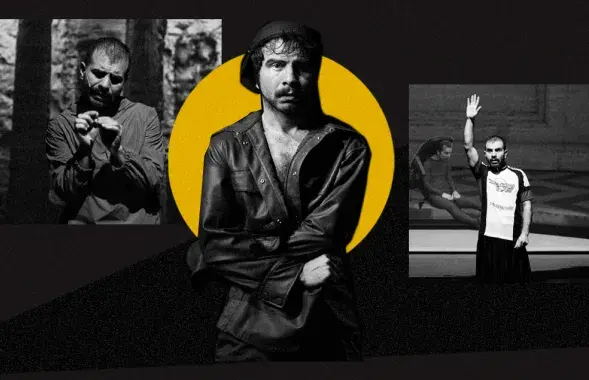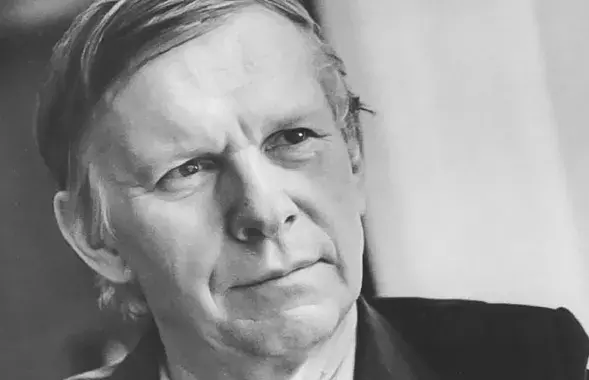Molchat Doma enjoy sold-outs in Europe but remain little known in Belarus

Molchat Doma / Euroradio
The new-wave post-punk trio Molchat Doma from Minsk, Belarus has increasingly been a hit around Europe, gathering full houses at clubs in Berlin, Helsinki or Toulouse. After a showcase in Tallinn, a British magazine described them as a world-class band. But back in Belarus, Molchat Doma remains quite unknown. Euroradio.fm has asked Pavel Kozlov, Yegor Shkutko and Roman Komogortsev to explain why it is so.
Showcases do work
Why has your music become popular in the West and not at home in Belarus?
Yegor Shkutko: We are yet to figure out what could have played a role. Suddenly, we are popular in Europe. Our album has by now attracted over a million views on YouTube, we featured on post-punk.com where we ranked among the top albums of 2018. It all started rolling in 2019. We also played at the showcases - Tallinn Music Week and Iskra Showcase, and those events trampolined us to other festivals as well.
You can say the showcases do work?
Yegor Shkutko: Yes, they do. We can even give a piece of advice to other bands: go ahead and apply [to participate in a showcase]. The thing can be good for you.
Mom wanted me to become an engineer
What did your parents say when you started doing music professionally two years ago? What are they telling you now that they see the list of the cities on your Europe tours?
Yegor Shkutko: Initially, they were totally against, because they thought it interfered with my job - I was selling radio electronics stuff. You know, I was trained to be an electrician. It was only natural for them to look at it like nothing more than a hobby. But later when we embarked on our first tour across Europe, they slowly became loyal. Now that it brings revenues and we can earn from it, they have stopped complaining.
Pavel Kozlov: Actually, this can be quite painful. My parents were brought up in the Soviet Union, and the way they learned to perceive the world is that you must have a permanent job and a stable pay to sustain a family; that is a priority [to them]. Once you have ensured this, there is time and space for other things you like doing. It has been quite hard to convince them that one can live from music professionally and even earn your daily bread. I have tried to convince my Mom since our first tour, but I still feel that she is not approving. She still wants me to have a stable job, a family, kids, and stuff so that she can finally be happy.
Roman Komogortsev: In my case, things have turned for the better. Mom always wanted me to become an engineer, and I was doing my university studies as a construction engineer. But at some point, things went wrong, and I got expelled from the university. That’s exactly when our music started to pick up popularity. And my Mom was kind of looking at me having realized that it would be fruitless to try and influence me. So, she probably thought that I had made my choice and decided to let it go with the flow. I hope that now she feels proud of me.
We simply listened and continue to listen to music from the 1980s
You mean you are playing post-punk without professional musical background? Perhaps, it is even better, this way?
Roman Komogortsev: It is very possible. It may be simple music, but you can’t do without music basics.
Pavel Kozlov: It is not that simple. You can’t just sit, listen to something and then think to yourself that you want to play post-punk. You can’t just go and buy a bass or guitar and start playing without any previous experience with music. I learned how to play various instruments at a music school for around 7.5 years, but I didn’t finish my studies. Naturally, I couldn’t just quit music. From Grade 3, I have been sick with music, waiting all the time for something big to happen. When something interesting like today happened, I still can’t believe it or realize that what I wanted has already been here.
Why did you get attracted by the 1980s esthetics, new-wave and post-punk? You do not come from those times.
Yegor Shkutko: All we have been doing is listening to music from the 1980s, getting inspired and creating what we like.
How did you figure out that you are the trio that can become popular in Europe?
Pavel Kozlov: We didn’t have it [all laughing]. It wasn’t like we got together, played for six months and decided that we were ready to conquer Europe. Even when we became relatively popular on YouTube, we didn’t have that feeling all the same.
Could you imagine at all that your music would be enjoyed in the West and not here?
Yegor Shutko: We did not set any concrete goals.
Pavel Kozlov: Basically, from the very beginning, we simply did what we liked and that was all.
Yegor Shkutko: We had no goals to tour across Europe and play sold-out gigs. We were simply doing and continue doing what we like. We just go with the flow.
Okay, but now you must be setting goals, are you?
Yegor Shkutko: Sure. This is our main modus operandi now. We set goals for some gigs or events. But again, we go with the flow. We are not overzealous.
“Come to Mexico”
Do you have any stats on the YouTube views? Who are all those people? Who is part of those million views? [As of this publication, the number of views is over 1.5 million]?
Yegor Shkutko: Around 30% of total views come from Mexico of all places. We also have fans in the United States and other countries. I have no idea why Mexico stands out and how they even learned about us. The majority of comments are written by Mexicans. This is hilarious and interesting.
Roman Komogortsev: For example, we upload photos from our gig, let’s say, in St Petersburg, Russia, but then you see there are ten “Come to Mexico” comments.
Am I right to say that Molchat Doma will have the next tour in America?
Pavel Kozlov: We would love too. We are working hard on this now.
Yegor Shkutko: Talks are underway to perform in South America and the US.
Your manager Dmitry Khlamov told us that you receive letters. Are those letters from fans or some business offers?
Yegor Shkutko: The letters are from concert organizers, not from fans. They write offering to organize a gig in their country or city. There are many of them from around the world. It was they who made our big European tour possible. But it is not easy, all those borders, visas – especially when it comes to America. All of this requires a special effort.
People want to hang out with you, but all you want is to sleep
You must be stressed. It is pure Belarusian stress because it doesn’t get manifested in any way...
Yegor Shkutko: When you have over 30 cities on your tour, travel can be very tight. You also have to watch your stuff and not to get lost (all laughing).
But you can see Europe …
Yegor Shkutko: Getting to know is when you have at least one free day for a walk around. In our case, it is come, perform and leave for the next destination.
Pavel Kozlov: Initially, we thought like yeah it is going to be cool to travel and see so many cities. But in reality, you have gigs every day and, tired from travel, play till late at night and everyone wants to hang out with you… But all you want to do is to sleep… At some point, you don't care about sightseeing.
Yegor Shklutko: It is funny when my family members tell me: wow you are going on tour, you are going on holiday. This is not a vacation at all.
Pavel Kozlov: It has turned out that music is not about hanging out. This is about hard work. You realize only when on a tour, how hard it is indeed.
We have no plans to become part of the mainstream
Will you continue to work in this genre? Can you imagine yourself doing something trendier four or five years from now?
Roman Komogortsev: Our idea was to do something in the same genre and using the same sound that we liked listening to. [The Soviet band] Kino was our biggest inspiration, so Kino’s sound was a model. This old-school tape or vinyl sound was the trademark feature that we wanted to promote.
That’s why your first album was released on tape?
Pavel Kozlov: Yes. But again, we are not aiming anywhere. We are just doing what we like. If something else pops up, we will do something else. At the moment, what we do matches our music tastes.
Roman Komogortsev: We don’t seek to fit into the mainstream because people say this and that is trendy now. We just do what and how we want.
Yegor Shkutko: We don’t know what happens next.
What is the reaction of your German label to the surge in your popularity?
Roman Komogortsev: Shocked.
Yegor Shkutko: To some degree, the label works only for us but also waits for new releases.
Our city inspires us
In your view, what is happening to Belarusian music now?
Yegor Shkutko: It is there, it exists. It lives and is even flourishing, to some extent.
To what extent?
Yegor Shkutko: We are not the only ones touring in Europe. There are other bands playing gigs in Europe’s clubs and beyond. Their number is growing and this is great.
Roman Komogortsev: They just need to be a little bit more active.
Pavel Kozlov: In the earlier days when instrumental music was on the rise, or at the times of rock-n-roll, indie, everyone somehow thought that one had to sing in English and some label would spot them one day and one gets somewhere. But this does not work like this, Absolutely not. Language does not matter. If you play small gigs and have to stand and sell tickets just to cover the costs of the venue rental, nothing will happen. One just has to be more active.
Roman Komogortsev: There has been quite a lot of really good Belarusian music. But most of the bands remain underground, and I would love those bands to emerge and let people know about what they do. But they don’t, and this frustrates me a lot.
Pavel Kozlov: We played out first gigs in Moscow and St Petersburg. To go there, we invested our own money and would end up heavily in the red. But our buddies would tell us that we are idea-driven. That’s true. If you want to achieve something badly, you must put an effort, keep moving, develop and search for something. Do not just sit. It is not enough just to upload your music online and wait for someone maybe liking it.
What is your music idea? Why has it been a success?
Yegor Shkutko: We sing about what happens in our lives and the lives of other people. We live in a relatively Soviet-style city. Well, we did not live in the Soviet Union but having looked at Minsk and what is happening in it, I think nothing has changed in terms of architecture and other things. Our city, our life in it and society we live in, these are the things that inspire us.




















